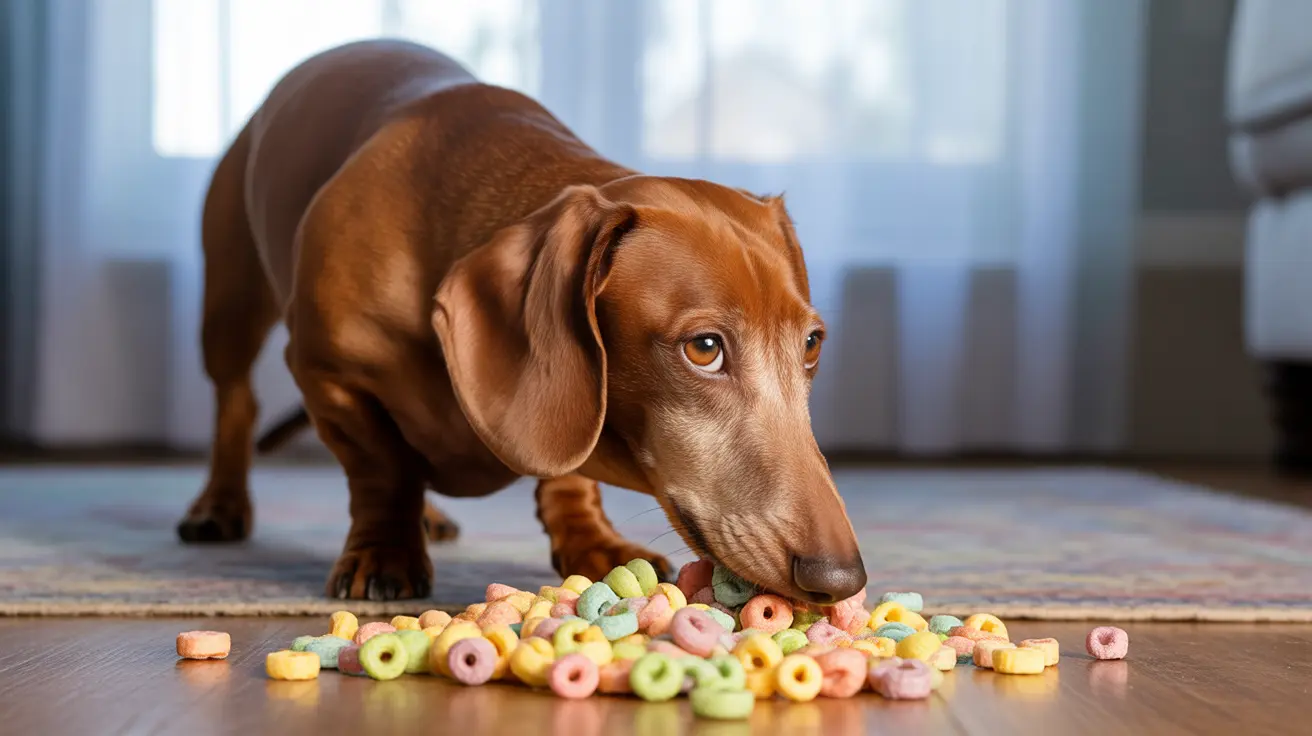Understanding the Ingredients in Froot Loops
Froot Loops primarily consist of refined grains, high amounts of sugar, artificial colors, and various preservatives. Despite their fruity name, these cereals contain virtually no real fruit ingredients. The main components that raise concerns for dogs include:
- High sugar content (nearly 50% by weight)
- Artificial food colorings (Blue 1, Red 40, Yellow 6)
- Refined grains (corn and wheat flour)
- Preservatives and artificial flavors
Health Risks of Feeding Froot Loops to Dogs
Immediate Health Concerns
While Froot Loops aren't immediately toxic to dogs, they can cause several short-term health issues:
- Digestive upset and diarrhea
- Vomiting
- Bloating and gas
- Stomach discomfort
- Potential allergic reactions to artificial ingredients
Long-term Health Risks
Regular consumption of Froot Loops can lead to serious health problems in dogs:
- Obesity from excess calories and sugar
- Dental problems and tooth decay
- Increased risk of diabetes
- Potential food allergies
- Nutritional deficiencies if used to replace proper dog food
Safe Alternatives to Froot Loops
Instead of sharing Froot Loops with your dog, consider these healthier alternatives:
- Commercial dog treats specifically formulated for canines
- Small pieces of fresh fruits (apple slices, blueberries)
- Plain, unsweetened cereals in very small amounts
- Specialty dog treats designed to mimic cereal shapes
- Natural, protein-based treats
What to Do If Your Dog Eats Froot Loops
If your dog manages to snack on some Froot Loops, follow these steps:
- Assess the amount consumed
- Monitor for signs of digestive upset
- Ensure fresh water is available
- Contact your veterinarian if symptoms become severe
- Watch for signs of allergic reactions
Frequently Asked Questions
Can dogs safely eat Froot Loops or is it harmful to their health?
While not immediately toxic, Froot Loops are not safe for regular consumption by dogs. The high sugar content and artificial ingredients can lead to various health issues, making them an inappropriate treat choice for canines.
What are the risks of feeding my dog Froot Loops regularly?
Regular consumption of Froot Loops can lead to obesity, dental problems, diabetes, digestive issues, and potential allergic reactions to artificial ingredients. The high sugar content and lack of nutritional value make them particularly problematic for long-term health.
How many Froot Loops can I give my dog without causing digestive issues?
While a single Froot Loop likely won't cause immediate harm, it's best not to intentionally feed them to your dog at all. If accidental consumption occurs, limit it to 1-2 pieces maximum, and monitor for any adverse reactions.
Are there any dog-friendly treats similar to Froot Loops but healthier?
Yes, there are specially formulated dog treats that mimic the shape and appeal of cereals while being nutritionally appropriate for dogs. Look for treats specifically made for dogs that contain natural ingredients and appropriate nutrients.
What symptoms should I watch for if my dog accidentally eats a large amount of Froot Loops?
Monitor your dog for signs of digestive upset including vomiting, diarrhea, lethargy, excessive thirst, or unusual behavior. If any concerning symptoms develop or persist, contact your veterinarian immediately.
Conclusion
While Froot Loops might be a beloved breakfast cereal for humans, they have no place in a dog's diet. The high sugar content, artificial ingredients, and lack of nutritional value make them an inappropriate treat choice for our canine companions. Instead, focus on providing your dog with treats specifically formulated for their dietary needs and overall health.
Remember, when it comes to treating your dog, it's always better to err on the side of caution and stick to veterinarian-approved options that support their health and well-being.






